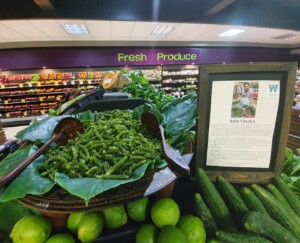Sera struggles with her nama business
December 7, 2020
 By Neehal Khatri
By Neehal Khatri
Sera Baleisasa sells nama, a type of edible seaweed, for a living and sales haven’t been good over the past few months.
In February this year, before the COVID-19 pandemic hit Fiji, Sera began selling nama four times a week to a supermarket in Suva. The Women in Fisheries Network – Fiji (WiFN-Fiji) had selected her to be the supplier for a supermarket chain they had partnered with in an initiative to connect women fishers and communities to markets. This was good news as it meant Sera now had a secure buyer and no longer had to spend days away from her family to sell nama at the municipal market.
Sera hails from Namuaimada Village in Rakiraki, where the women specialise in harvesting nama (Caulerpa racemosa) – an edible seaweed, also known as sea grapes, which is found in shallow waters near the reef. The harvesting of nama in Sera’s village is done mainly by women, who go out in fishing boats to the reefs during low tide and spend about four hours harvesting the seaweed. Typically, the women harvest nama four times a week – on Monday, Tuesday, Thursday and Friday.
According to WiFN-Fiji’s Rapid Care Analysis report funded by Oxfam on the role and engagement of women in fisheries in Fiji, women are expert fishers in the coastal zone and the dominant sellers of seaweed, crustaceans and molluscs, with many fishing for household needs and selling the surplus. However, even though women play a critical role in inshore fisheries, they still face traditional and institutional barriers, and often have to depend on their menfolk to access financial support and be their voices in decision-making relating to fisheries development and management.
 Declining demand affects livelihoods
Declining demand affects livelihoods
Sera shared that since the onset of the COVID-19 pandemic, consumer demand for nama has declined, both at the supermarket she supplies to and at the Suva Municipal Market where the women from her village sell their harvest.
Over the past few months, Sera has had to reduce the number of deliveries she makes to the supermarket from 4 to 2, which has halved her income to about $160 to $200 per week. Her expenses include the hiring cost of the fishing boat – $15 per trip which she splits with other passengers – and freight cost of $2 per pack to send nama by bus from Rakiraki to the Suva Bus Station, from where her father collects it and delivers it to the supermarket.
She said selling to the supermarket was her only option at the moment, since the women from her village were also struggling to sell their nama supply, which has a short shelf life of only a few days, at the municipal market.
As Sera is the main breadwinner in her family, which includes her husband, four children and one granddaughter, this has caused a strain to her household financial situation. While her husband plants vudi (plantain) and cassava, it is mostly for subsistence use and brings in only a small amount of income. With a tight financial situation, Sera sometimes has to borrow money from people within her village and is able to repay it at zero interest rate.
Sera shared that she is looking for support to find an additional market for her nama business. She is also keen to diversify her business by opening a canteen, where she can also sell fuel – a much-needed item in the village as there are 11 fishing boats. This would help her reduce her family’s dependency on the nama business, which isn’t doing so well at the moment.
To support Sera, you can buy nama from the New World IGA supermarket at Damodar City Centre in Suva. Her mobile number 8427317.
In the Spotlight: Informal Women Workers
As part of the 16 Days of Activism global campaign, we are sharing a series of stories featuring the experiences of women entrepreneurs in the informal sector as well as those who have transitioned, or are transitioning, into the formal sector.
16 Days of Activism is a global campaign focused on ending violence against women and promoting women’s rights. In 2020, the Campaign is dedicated to informal women workers whose lives and livelihoods have been acutely impacted by COVID-19 and the unprecedented economic crisis that has followed. According to the International Labour Organization, more than 60% of the world’s employed earn their living in the informal economy and 92% of women in employment in developing countries are informally employed. They face precarious workplace conditions and are typically excluded from national labour laws and denied social protection.
The Australian Government through the Fiji Women’s Fund has been supporting women’s groups, networks and organisations to amplify the voices of women in the informal sector through our partnerships with grantees like the Women Entrepreneurs Business Council, Women in Fisheries Network, Talanoa Treks, Rise Beyond the Reef, Fiji Disabled Peoples Federation, Ra Naari Parishad, Naitasiri Women in Dairy, Waisomo Women’s Group and the Soqosoqo Vakamarama Kadavu.
Recent Whats New
WFF Visit to “Rise Beyond the Reef”
December 12 2023
LifeBread Confident Woman Program Graduation
December 12 2023
